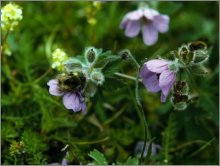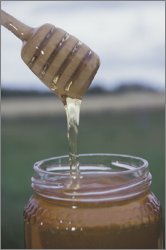Honey Works as Good as Cough Syrup:
Four Beneficial Uses of Honey
by www.SixWise.com
Beekeepers have been raising bees to produce honey since
at least 700 BC. Back then, this sweet, natural sweetener
was a rarity used in religious ceremonies and for medicinal
and cosmetic purposes.
|

Did you know that honeybees are disappearing at alarming
rates in the United States? Find out what this could
mean for the honey supply and, more importantly, the
entire
food supply.
|
Typically, the only people who could afford honey for eating
were the very wealthy.
Nowadays, you can find honey in a variety of colors, flavors
and textures (not to mention qualities) in just about every
supermarket.
What Exactly IS Honey?
Everyone knows the sticky, sweet honey that kids of all ages
love to lick from their fingers. But do you know how it's
actually created?
Bees use honey as food, and they make it by collecting nectar
from flowers. This nectar mixes with their saliva, which is
full of just the right enzymes to create honey. The nectar-saliva
mixture is then brought back to their beehive, where their
wings fan it into just the right consistency.
The flavor and texture of honey varies depending on the type
of flower from which the nectar came.
|

A small amount of honey at bedtime may soothe your
child's cough without any of the side effects of over-the-counter
cough medications.
|
Honey is More Than Yummy ... It's Healthy
As though you needed another excuse to add some honey to
your life, it turns out that honey is good for you in many
ways. Honey ...
1. Soothes a Cough Better Than Cough Syrup
With all of the concerns surrounding over-the-counter cough
and cold medications for kids (the FDA has issued a public
health advisory because they may not be effective, and they
can cause side effects), here's some welcome news.
A small amount of honey works just as well.
A study by researchers from Penn State College of Medicine
involved over 100 children with coughs between the ages of
2 and 18. Before bed, the children were given honey-flavored
cough syrup, honey or nothing at all.
Parents of children who received the honey rated their children's
sleep and symptoms as better, and noted improvements in their
own sleep as well.
The researchers noted that the type of honey may be important.
The children in the study were given dark-colored buckwheat
honey, and it's known that darker honeys have more antioxidants
than lighter honeys.
Note: Pediatricians do not recommend giving honey to children
under 1 year of age because of the risk of botulism spores.
2. Helps Heal Wounds
Honey is anti-bacterial, anti-viral and anti-fungal, and
all of these properties make it ideal for healing wounds.
It also dries out wounds effectively because of its low water
content while its high sugar content keeps microorganisms
from growing. Honey also contains an enzyme that produces
the disinfectant hydrogen peroxide when it touches a damp
surface like a wound.
In fact, it has been used to treat burns, ulcers and other
wounds for centuries.
Numerous studies show that honey heals wounds quickly, often
better than antibiotics. For instance, a 2003 study in the
European Journal of Medical Research found that infected wounds
after caesarean sections healed 85 percent of the time with
honey, and only 50 percent of the time with conventional treatments.
Earlier this year, the U.S. Food and Drug Administration
approved dressings made of Manuka honey (which has a unique
antimicrobial ingredient) for wound and burn treatment, making
it the first honey-based medical product in the country.
3. Increases Your Antioxidants
Your body needs antioxidants
to protect your cells from damaging free radicals. And consuming
buckwheat honey daily has been found to raise your blood levels
of beneficial antioxidants.
|

Alive
in 5: Raw Gourmet Meals in Five Minutes is the perfect
cooking companion for anyone who wants to explore raw
foods, or simply get more fresh, healthy and great-tasting
foods into their diet -- but doesn't have a lot of time
to do it.
|
4. May Lower Your Cholesterol
In a study of eight healthy people who were given solutions
of sugar, artificial honey or natural honey, the natural honey
was beneficial.
Whereas the sugar and artificial honey either caused negative
reactions or very small beneficial ones, the natural honey
reduced:
-
Total cholesterol by 7 percent
-
Triglycerides by 2 percent
-
C-reactive
protein by 7 percent
-
Homocysteine (a risk factor for heart disease) by 6 percent
-
Blood sugar by 6 percent
It also increased good HDL cholesterol by 2 percent.
All Honey is Not the Same
Much of the honey sold at supermarkets may contain additives
and is pasteurized, clarified and filtered, which may negate
some of the beneficial properties.
Your best choice for healthy, high-quality honey is to look
for 100 percent pure, RAW honey. This honey has not been heated
or processed, so it still contains all of its beneficial enzymes
and nutrients.
Related Articles
The
Amazing Health Benefits of Parsley, or, "Hey, I Shouldn't
Be Just a Table Garnish!"
The
Remarkable Antioxidant Power of Cranberries -- and Three No-Cost
Cranberry Recipes
Sources
Archives
of Pediatrics and Adolescent Medicine December 2007;161(12):1140-1146.
WashingtonPost.com
August 7, 2007
The
World's Healthiest Foods